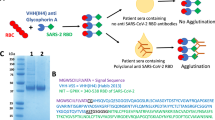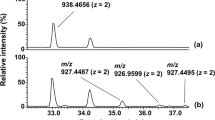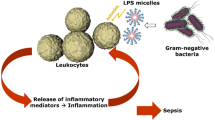Abstract
HUMAN red cells incubated with a broth culture filtrate of V. cholerœ acquire three new properties : they become panagglutinable1 ; they are no longer agglutinated by viruses of the influenza group2 ; and in the case of rhesus-positive cells, they become agglutinable by the corresponding incomplete Rh-antibody3. The finding that the influenza and Newcastle disease viruses produce the same three reactions on red cells2,4 has stimulated further study of this phenomenon.
This is a preview of subscription content, access via your institution
Access options
Subscribe to this journal
Receive 51 print issues and online access
$199.00 per year
only $3.90 per issue
Buy this article
- Purchase on SpringerLink
- Instant access to full article PDF
Prices may be subject to local taxes which are calculated during checkout
Similar content being viewed by others
References
Freidenreich, V., Acta Path. Microbio. Scand., 5, 59 (1928).
Burnet, F. M., McCrea, J. F., and Stone, J. D., Brit. J. Exp. Path., 27, 228 (1946).
Pickles, M. M., Nature, 158, 880 (1946).
Chu, C. M., and Coombs, R. R. A., Lancet, i, 484 (1947).
Francis, T., J. Exp. Med., 85, 1 (1947).
Morgan, W. T. J., Nature, 158, 759 (1946).
Burnet, F. M., McCrea, J. F., and Anderson, S. G., Nature, 160, 404 (1947).
Author information
Authors and Affiliations
Rights and permissions
About this article
Cite this article
CHU, C. Enzymic Action of Viruses and Bacterial Products on Human Red Cells. Nature 161, 606–607 (1948). https://doi.org/10.1038/161606b0
Issue Date:
DOI: https://doi.org/10.1038/161606b0
This article is cited by
-
Myxovirus-Hämagglutinationsversuche mit unterschiedlichen Erythrocytenarten
Zeitschrift für Hygiene und Infektionskrankheiten (1959)
-
Receptor-destroying enzyme in cerebrospinal fluid of a case of pneumococcal meningitis
The Irish Journal of Medical Science (1959)
-
Experimentally produced ‘Polyagglutinability’ (T-Transformation of Erythrocytes in vivo) in Guinea Pigs infected with Pneumococci
Nature (1954)
-
Untersuchungen über die Steigerung der Agglutinabilität roter Blutkörperchen durch Fermente aus Virus und Bakterien-Kulturen
Zeitschrift für Hygiene und Infektionskrankheiten (1950)
Comments
By submitting a comment you agree to abide by our Terms and Community Guidelines. If you find something abusive or that does not comply with our terms or guidelines please flag it as inappropriate.



